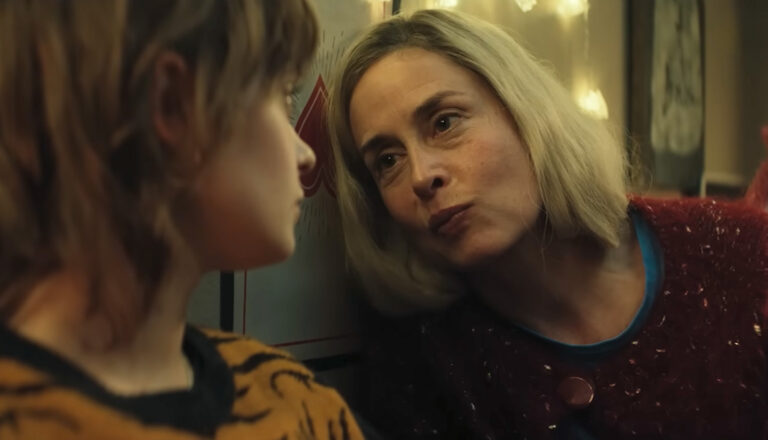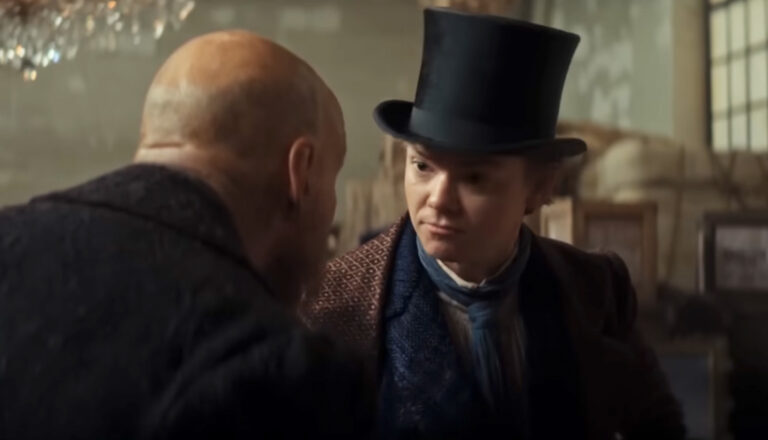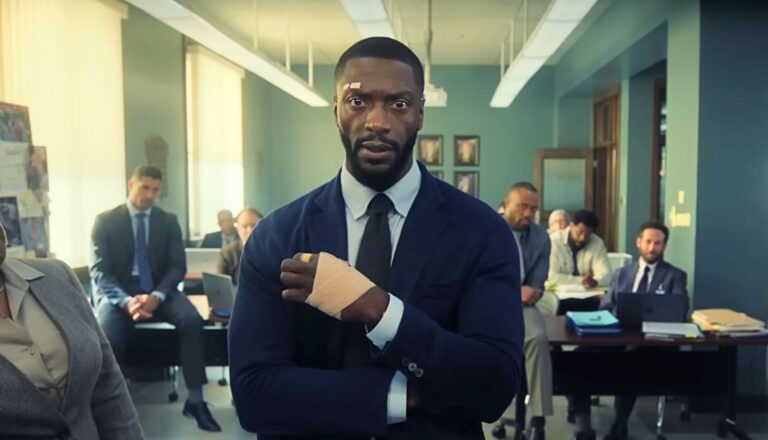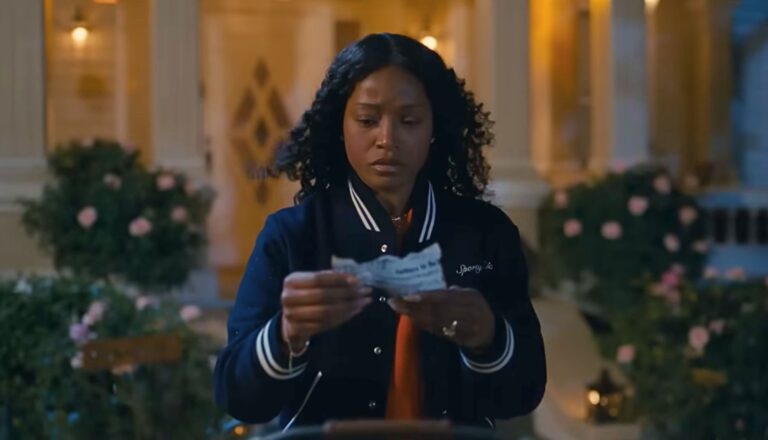
Unfamiliar
Filled with gritty violence and foul language, when it comes to this German spy drama, “unfamiliar” is how most viewers should stay.

What a difference 70 pounds can make.
So Patty Bladell discovers. And now that this former overweight high school student is beauty-queen pretty, she’s going to make anyone who ever mocked, bullied or ignored her when she was a “fatty” pay. And unlike Patty, it won’t be pretty.
By the way, neither is the show.
I’ll say this about Netflix’s Insatiable: The series is fittingly named. It’s predicated on the apparently unrestrainable cravings of its characters, beginning, naturally, with Patty herself.
Patty has had an unhealthy relationship with food from the time she was 8. Her mother—a one-time pageant winner herself—says that Patty’s childhood could not have been easy: “Looking like that, and having a mother who looks like me,” she sighs.
But that all changed after a homeless guy tried to steal a chocolate bar from Patty. “It’s not like you need it, fatty!” the man told her.
That led to a very literal food fight: She broke his nose. He broke her jaw, which needed to be wired shut and forced her to subsist on a liquid diet for three months. By the time the fight transitions to the courtroom, Patty’s shed the weight equivalent to a pre-pubescent middle schooler and has become the apple of her lawyer’s appraising eye.
Oh, don’t get the wrong idea. See, Bob Armstrong moonlights as a beauty-queen coach. His appreciation for Patty’s pretty form is purely platonic, he insists. Not that anyone else would buy that line. Bob was once accused of inappropriately touching a former pageant client, and he does seem to land in compromising positions with young, often underage, women on a disturbingly regular basis. His own words even undercut his innocence at times.
“I’m an advocate of women,” he insists to Patty’s mother, “especially young women. I want to touch as many of them as I possibly can.”
But when he looks at Patty, he doesn’t see a potential high school-age conquest. Instead, he sees a chance to reach the pinnacle of pageant success—and a chance to stick it to his rival, Bob Barnard, and his sash-wearing, crown-winning daughter, Magnolia. Patty, he says, is “My chance at redemption … [my] it gets better story for bullied fat girls and falsely accused molesters everywhere.”
He has an insatiable desire to win, you see. And Patty has simply exchanged one untamable hunger for another equally unhealthy fixation: from potato chips and ice cream to carb-free revenge.
With some other carnal cravings tossed into the mix, too, of course.
Netflix loves controversial programs filled with bitter, broken teens. Just a glance at 13 Reasons Why or its made-for-TV movie To the Bone will prove the point. As such, many people took one glance at Insatiable’s trailer—one that seemed to simultaneously critique fat-shaming while glamorizing thinness—and came away concerned, if not outright horrified.
Guess what? It was even worse than critics thought. Said The New York Times’ Aisha Harris: “I was admittedly apprehensive going into the first episode based on the trailer, but once I watched it, I was shocked to realize that an insensitive representation of bullying and obesity might actually be the least of this show’s problems.”
Indeed, this show’s problems are legion. Patty, 17, is determined to use sex as a weapon. She leads people on for her own nefarious purposes. She schemes to sleep with the homeless man who hit her and then crush his soul.
“Don’t you want your first time to be with someone who’s special? Someone who loves you?” Patty’s best friend, Nonnie, asks her, the young woman’s lesbian attraction to Patty plenty obvious to the viewer.
“No,” an oblivious Patty responds. “I’d rather have revenge.”
And then there’s Bob’s extraordinarily uncomfortable encounters with pretty high schoolers. The show is obsessed with these feints toward these inappropriate and often illegal would-be relationships, even if Bob himself says that he has little interest in them. And yet, he still uses these girls for his own purposes, too—to settle his own vendettas and further his own naked ambition.
Though presented as a satire, Insatiable still feels quite unseemly: A guilty pleasure with extra guilt, hold the pleasure. This is one item on Netflix’s menu that I’d send back.
Patty is being taken to court for punching a homeless guy in the nose. The case goes to Bob Armstrong, a down-and-out lawyer who hasn’t had a case since he was (falsely) accused of molesting one of his beauty-school contestants by her vindictive mother. Each looks at the other as a conduit for redemption. And each at times uses spiritual language to describe that opportunity.
Patty, for instance, considers setting one of her tormenters on fire. She says the catalyst for that violent brainstorm—seeing Drew Barrymore’s movie Firestarter on TV—was “a sign from God herself.” And Bob says that the first step on Patty’s quest for beauty-pageant dominance will come in the pageant for “Miss Magic Jesus.”
Bob and his wife, Coralee, host a fundraiser for anal cancer. The ribbons for the fundraiser are brown, naturally; Bob, while reciting some of the embarrassing side effects of the disease, calls the cancer a “silent killer.” (A woman in the audience makes flatulent noises as he talks.) Bob’s son and wife both refer to the disease using an anatomical vulgarity.
Bob Armstrong’s rival, Bob Barnard, strips off his shirt in front of him, showing off his physique. Barnard also shares an uncomfortably intimate kiss with his wife. Bob Armstrong and his wife “celebrate” something in the kitchen, unzipping various bits of their clothes in preparation. Afterward, Bob’s teen son Brick tells him that he has “something” on his pants. Bob Armstrong is also lured into the bedroom of Magnolia, Bob Barnard’s daughter. She’s been drinking scotch and strips down to her underwear in front of him (which he, we and a photographer outside see).
Patty wears revealing clothes: At one juncture, she’s described as dressing like an “underage hooker.” She kisses and leads on a would-be witness at her trial, convincing him to lie for her. (She lies, too.) She toys with losing her virginity to someone, but when he passes out in bed before she can complete the deed—cigarette in mouth and open vodka bottle beside him—she pours vodka on his underwear-clad body and strikes a match. Other women wear revealing clothes, too, and many seem to constantly be in the process of trying to seduce someone.
Patty’s best friend, Nonnie, is a lesbian and obviously infatuated with Patty. We hear references to losing one’s virginity, oral sex, transsexuals (called “trannies”), erections, homophobes, underage sex, molestation and passing out drunk in vacant fields. Lots of crude double entendres are made. High schoolers buy beer and drink vodka. Characters say “a–,” “b–ch,” “d–n,” “h—” and “p-ss” and misuse God’s name five times.

Paul Asay has been part of the Plugged In staff since 2007, watching and reviewing roughly 15 quintillion movies and television shows. He’s written for a number of other publications, too, including Time, The Washington Post and Christianity Today. The author of several books, Paul loves to find spirituality in unexpected places, including popular entertainment, and he loves all things superhero. His vices include James Bond films, Mountain Dew and terrible B-grade movies. He’s married, has two children and a neurotic dog, runs marathons on occasion and hopes to someday own his own tuxedo. Feel free to follow him on Twitter @AsayPaul.

Filled with gritty violence and foul language, when it comes to this German spy drama, “unfamiliar” is how most viewers should stay.

Oliver Twist’s Artful Dodger isn’t 13 anymore: He’s an adult. And being an adult comes with more grown-up problems.

Though it’s compelling, the content concerns in Prime Video’s ‘Cross’ might be enough to cross it off your watch list.

‘The ‘Burbs’ is Peacock’s attempt to adapt the 1989 movie of the same name. But a fresh coat of paint doesn’t hide the content issues.